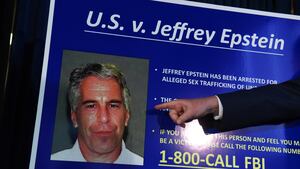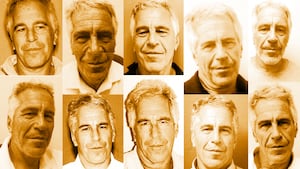Editor's note: On August 10, 2019, Jeffrey Epstein died in an apparent jailhouse suicide. For more information, see The Daily Beast's reporting here.
FBI agents found “piles of cash,” dozens of diamonds and an expired foreign passport in Jeffrey Epstein’s when they raided his Manhattan mansion last week, prosecutors revealed Monday.
Prosecutors said the passport was issued by Austria, was dated in the 1980s, and gave a residence in Saudi Arabia. It was not issued under Epstein’s name but did have what appeared to be a photo of him. Prosecutors have not determined if it was issued by the government or is a fake, they said.
The safe’s contents were disclosed during a bail hearing at which prosecutors—and accusers—argued that Epstein is a flight risk and should be kept locked up until his sex-trafficking trial.
“I was sexually abused by Jeffrey Epstein starting at age 14,” accuser Courtney Wild told the court. “I would just like the court to not to grant him bond, just for the safety of any other girls out there. He is a scary person to have walking the streets.”
Another woman, Annie Farmer, said she was 16 when she met Epstein and he flew her to New Mexico. “He was inappropriate with me,” she said.
Farmer’s older sister, Maria, claimed in an affidavit in April that Epstein had abused her underage sister in New Mexico and also accused Epstein and his alleged madam, socialite Ghislaine Maxwell, of raping her at billionaire Les Wexner’s Ohio Mansion. The retail mogul Wexner is Epstein's only known client. He did not respond to Maria Farmer’s allegations.
Journalist Vicky Ward has said that the Farmer sisters and their mother tried to warn about Epstein’s sexual predations in 2003 for her now-famous profile of the financier for Vanity Fair, but that editor Graydon Carter cut the allegations from the final piece. (Carter has claimed that he didn't “have confidence” in Ward's reporting at the time.)
Epstein, 66, looking fatigued and wearing navy-blue jail garb, stared blankly ahead for most of the hearing.
He has been held at the federal Metropolitan Correctional Center in Manhattan since his July 6 arrest but has asked to be released and put on house arrest with armed guards and surveillance.
Prosecutors said that was inadequate to make sure he would not skip town.
“The defendant is asking for special treatment to build his own jail,” Assistant U.S. Attorney Alex Rossmiller told the court, adding that Epstein has “vast assets and every incentive in the world to use those assets.”
Bank documents the government got last week show Epstein has $110 million in a single account—and another $400 million in various holdings, Rossmiller noted.
A federal probation office agrees with prosecutors that Epstein should be detained, but U.S. District Judge Richard Berman said he has not decided whether to grant bail and won’t announce a ruling until Thursday.
He told the defense he is not satisfied with the financial information that Epstein filed under seal, which amounted to “less than a page,” and is inclined to make it public.
Epstein’s team said the bail submission was “admittedly rough.” But, attorney Martin Weinberg added, “Let me be blunt, whatever bond you want Mr. Epstein to sign... he will sign. He fully intends to appear.”
To bolster his argument that Epstein should be allowed to await trial on house arrest in what prosecutors referred to as his “gilded cage,” Weinberg dropped the names of two of the biggest financial villains in modern U.S. history who got bail: Ponzi schemer Bernie Madoff and Enron felon Jeffrey Skilling.
“He’s not an out-of-control rapist,” Weinberg said of his client.
“How do you know that?” Judge Berman retorted.
Monday’s hearing followed a flurry of filings in which Epstein’s defense team and federal prosecutors dueled over whether the filthy-rich financier would go on the lam if he was released.
The government argued that Epstein’s international connections and wealth meant it would be easy for him to get beyond the arm of the law.
Even if he didn’t turn fugitive, prosecutors argued, Epstein has a history of witness-tampering, including wiring $350,000 late last year to two alleged accomplices after the Miami Herald published its expose on his Florida plea deal.
Epstein’s attorneys, on the other hand, have argued that the indictment unsealed last week is so flimsy that their client, who pleaded not guilty, has no reason not to fight the charges.
“You don’t punish first and have a trial second,” Weinberg told the judge.
Epstein has offered up a bail package that included armed guards and surveillance cameras, a GPS ankle monitor, and a “trustee” who would live in the seven-story mansion and report back to the feds.
Epstein had just returned from France—where he has a luxury apartment on one of the showiest boulevards in Paris—when the FBI swooped down a week ago and arrested him at Teterboro Airport in New Jersey.
Two days later, an indictment charging him with sex-trafficking and conspiracy was unsealed, revealing accusations that the former prep-school math teacher had paid dozens of girls for massages that turned sexual and turned some of them into recruiters. Authorities also found hundreds of nude and semi-nude photos they believe include minors.
The allegations were not new. More than a decade ago, authorities in Florida investigated Epstein for the very same thing, but U.S. Attorney Alex Acosta signed off on a sweetheart deal that allowed him to plead guilty to a state prostitution charge. He served 13 months of an 18-month-sentence in jail, while being allowed to leave for several hours during the day on work release.
The Miami Herald investigation of that plea deal, along with lawsuits by accusers, helped amp up the pressure on Epstein, and the U.S. Attorney in Manhattan launched a new probe, which culminated in the indictment and arrest warrant earlier this month.
Those prosecutors have left open the door to a superseding indictment that could contain more charges against Epstein or add alleged accomplices as co-defendants. Prosecutors from the public corruption unit are in charge of the case, though authorities have not said whether any government officials are targets of the ongoing investigation.
Although the indictment details alleged crimes against just three girls between 2002 and 2005, other accusers have come forward since Epstein’s arrest—in New York and in New Mexico, where he owns a spread of land called the Zorro Ranch.
The case, Rossmiller said, is “getting stronger every day.”
Epstein also owns a private island in the Caribbean and a lavish estate in Palm Beach, a fleet of cars and a private jet that has hosted former President Bill Clinton, actor Kevin Spacey, Prince Andrew, and lawyer Alan Dershowitz.
Two of Epstein’s accusers have said in court papers that Dershowitz was aware of and even took part in the sex with minors—which he has vigorously denied. Clinton put out a statement last week distancing himself from Epstein, but failed to mention at least one dinner they attended.
The Epstein scandal has already had a political impact. Acosta, who chose not to charge Epstein federally in Florida when he was U.S. attorney, was forced to step down as President Trump’s labor secretary amid fury over his actions in the case.
Trump used to be pals with Epstein but claims to have had a falling-out with him a decade ago.
Additional reporting by Marianne Dodson
Editor’s note: The story has been updated to correct the origin of the passport found in Epstein’s safe. Prosecutors initially told The Daily Beast that it was from Saudi Arabia but on Tuesday said it was Austrian.












